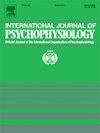Short-term recovery sleep attenuates the impairment of response inhibition after total sleep deprivation: Evidence from an event-related potentials study
IF 2.5
3区 心理学
Q3 NEUROSCIENCES
引用次数: 0
Abstract
Objectives
Sleep deprivation is increasingly a problem in modern society. Therefore, understanding the restorative effects of short naps on cognitive function after sleep deprivation has considerable relevance. This study investigated changes in response inhibition function after 30 h of total sleep deprivation (TSD) and the impact of 1 h of recovery sleep (RS) on the recovery of this function.
Methods
Twenty-seven healthy male participants performed a visual Go/No-Go task while event-related potentials (ERP) were recorded. Response inhibition was assessed at three time points: at baseline (0 h of TSD), after 30 h of TSD, and after 1 h of RS.
Results
The results from the behavioral indicators revealed a significant increase in reaction times to the Go stimuli (p = 0.013), a decrease in accuracy (p < 0.001), and a substantial rise in the error rate for the No-Go stimuli (p = 0.001) after 30 h of TSD compared with baseline. After 30 h of TSD, there was no significant improvement in task performance after 1 h of RS. ERP analysis showed a significant prolongation of the latencies of N2 (p = 0.012) and P3 (p = 0.010), a significant increase in P3 amplitude (p = 0.048), and no significant change in N2 amplitude after TSD compared with that at baseline. After 1 h of RS, N2 amplitude significantly increased (p = 0.010) and P3 latency remained prolonged (p = 0.008).
Conclusions
After thirty hours of sleep deprivation, the brain maintains task performance primarily through compensatory mechanisms. 1 h of RS partially ameliorates the impaired response inhibition caused by thirty hours of sleep deprivation, restoring this function closer to baseline levels.
短期恢复性睡眠减轻全睡眠剥夺后的反应抑制损害:来自事件相关电位研究的证据
睡眠剥夺在现代社会日益成为一个问题。因此,了解短时间小睡对睡眠剥夺后认知功能的恢复作用具有相当大的相关性。本研究探讨了30 h全睡眠剥夺(TSD)后反应抑制功能的变化,以及1 h恢复性睡眠(RS)对该功能恢复的影响。方法对27名健康男性受试者进行视觉Go/No-Go任务,同时记录事件相关电位(ERP)。在三个时间点评估反应抑制:基线(TSD 0小时),TSD 30小时后和rs 1小时后。结果行为指标结果显示,对Go刺激的反应时间显著增加(p = 0.013),准确性下降(p <;0.001),与基线相比,TSD 30小时后No-Go刺激的错误率大幅上升(p = 0.001)。经颅电刺激30 h后,经颅电刺激1 h后的任务表现无显著改善,ERP分析显示,脑电刺激后N2潜伏期明显延长(p = 0.012), P3潜伏期明显延长(p = 0.010), P3振幅显著增加(p = 0.048),而脑电刺激后N2振幅与基线相比无显著变化。RS 1 h后,N2振幅显著升高(p = 0.010), P3潜伏期延长(p = 0.008)。在30小时的睡眠剥夺后,大脑主要通过代偿机制来维持任务表现。1小时的RS部分改善了由30小时睡眠剥夺引起的反应抑制受损,使该功能恢复到更接近基线水平。
本文章由计算机程序翻译,如有差异,请以英文原文为准。
求助全文
约1分钟内获得全文
求助全文
来源期刊
CiteScore
5.40
自引率
10.00%
发文量
177
审稿时长
3-8 weeks
期刊介绍:
The International Journal of Psychophysiology is the official journal of the International Organization of Psychophysiology, and provides a respected forum for the publication of high quality original contributions on all aspects of psychophysiology. The journal is interdisciplinary and aims to integrate the neurosciences and behavioral sciences. Empirical, theoretical, and review articles are encouraged in the following areas:
• Cerebral psychophysiology: including functional brain mapping and neuroimaging with Event-Related Potentials (ERPs), Positron Emission Tomography (PET), Functional Magnetic Resonance Imaging (fMRI) and Electroencephalographic studies.
• Autonomic functions: including bilateral electrodermal activity, pupillometry and blood volume changes.
• Cardiovascular Psychophysiology:including studies of blood pressure, cardiac functioning and respiration.
• Somatic psychophysiology: including muscle activity, eye movements and eye blinks.

 求助内容:
求助内容: 应助结果提醒方式:
应助结果提醒方式:


